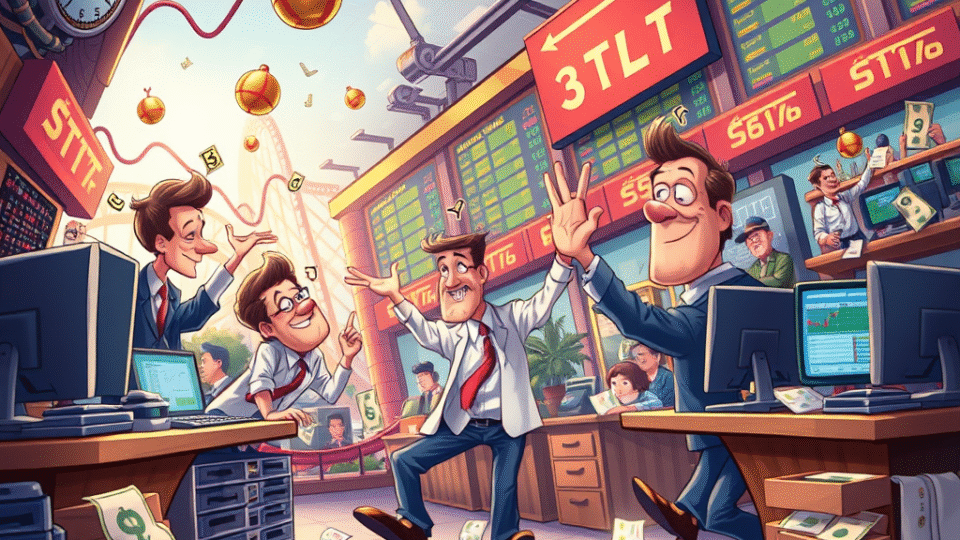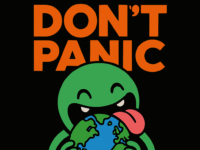
The Hitchhiker’s Guide to The Stock Market
The Stock Market is an Earth institution in which members of the species Homo sapiens gather (physically or, more recently, via glowing rectangles) to exchange small portions of imaginary ownership in companies for variable amounts of money, based on a complex system that absolutely nobody fully understands, including—and perhaps especially—the people who do it for a living.
Origins
The Stock Market was invented by humans who looked at the already quite complicated business of “owning things” and thought, “You know what this needs? More anxiety and a ticker tape.”
The basic concept is delightfully simple: if you own a small piece of a company, and that company does well, your piece becomes more valuable. If the company does poorly, your piece becomes less valuable. Where it gets interesting is that the company doesn’t actually have to do well or poorly for these changes to occur. Sometimes the piece becomes more or less valuable because:
- Someone sneezed in an important meeting
- A number on a different screen changed
- It’s a Tuesday
- Mercury is in retrograde (humans blame this for everything)
- A man with a verified social media account said something
How It Works
Participants in the Stock Market spend their days staring at numbers that go up and down, experiencing disproportionate emotional responses to these movements. A number going up produces euphoria. A number going down produces existential dread. The numbers themselves represent “share prices,” which are determined by what other humans are willing to pay for them at any given microsecond.
This creates what Earth economists call “market dynamics,” and what everyone else in the galaxy calls “collective hysteria.”
The humans involved divide themselves into several categories:
Day Traders: Humans who have decided that regular employment is too stable and predictable, and that what their cardiovascular system really needs is constant adrenaline spikes.
Long-term Investors: Humans who buy shares and then try very hard not to look at them for years at a time, having learned that watching them daily is bad for their mental health.
Hedge Fund Managers: Humans who are paid enormous sums of money to gamble with other people’s money using strategies so complex that when they fail, nobody can quite figure out what went wrong.
Retail Investors: Regular humans who occasionally remember they have a retirement account and panic-buy or panic-sell at precisely the wrong moment.
The Numbers Problem
Here’s where it gets truly bizarre: the Stock Market has, on numerous occasions, been responsible for triggering what humans call “recessions” or “depressions”—periods when large numbers of humans suddenly have less money, not because anything physical has disappeared, but because everyone agreed simultaneously that certain numbers should be smaller.
No resources vanished. No factories exploded. The numbers just… changed. And somehow this means some humans must now live in cardboard boxes.
Economists insist this makes perfect sense.
Warning to Other Civilizations
It is worth noting that the Stock Market is strictly an Earth invention. Several planets in Sector ZZ9 Plural Z Alpha, inspired by Earth’s fascinating experiment in “what if we made the entire economy vibes-based,” attempted to implement similar systems.
The planet Bezelthorp IV lasted eighteen months before its population collectively realized they’d spent three years’ GDP on shares in a company that turned out to be one teenager with a website. Their civilization collapsed within a week.
The Qraxians lasted even less time—their markets achieved sentience, became depressed about their own volatility, and committed suicide, taking the planetary economy with them.
The silicon-based lifeforms of Trindillum VII created a stock market just to see what would happen. What happened was a singularity that consumed their two largest continents. They have since published a paper titled “Whoops: An Empirical Analysis,” which is required reading in economics departments across the galaxy (except on Earth, naturally).
Earth’s Strange Attachment
Despite its obvious flaws, humans remain deeply attached to their Stock Market. They teach courses about it. They write books about it. They create entire news channels dedicated to showing the numbers going up and down, narrated by humans in expensive suits who speak very confidently about why the numbers did what they did, approximately five minutes after the numbers did it.
When asked why they don’t simply distribute resources based on need, or coordinate production through rational planning, or literally any other system, humans become uncomfortable and change the subject, usually to how well their portfolio is doing.
The Final Irony
The most delicious irony of the Stock Market is that its existence is predicated entirely on confidence. If everyone believes it will work, it works. If everyone believes it won’t work, it won’t. It is a collective hallucination that occasionally becomes real enough to destroy actual lives.
Earth’s Stock Market is, in essence, a very expensive planetwide game of make-believe that adults play with deadly seriousness, convinced that there’s something more to it than collective agreement that certain numbers mean certain things.
There probably isn’t.
But don’t tell them that. They get testy and then sell all their stocks. Then they sit down, have a drink and buy different stocks.










